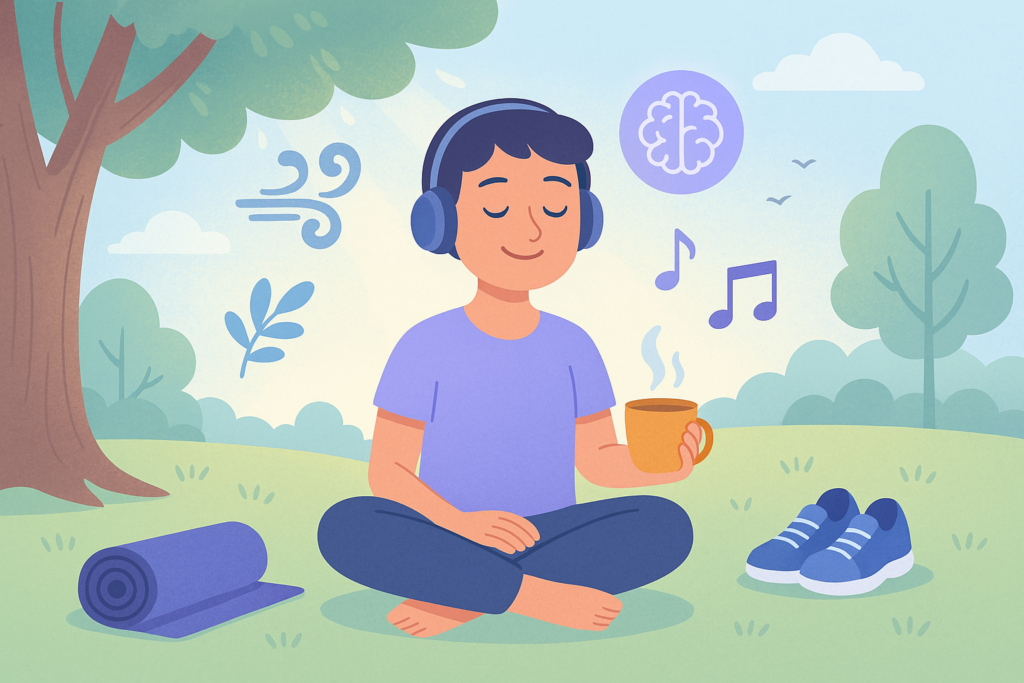In today’s fast-paced world, adopting healthy habits is no longer just a recommendation—it’s a necessity. Many people struggle with fatigue, poor sleep, lack of motivation, and increasing stress levels, all of which can be significantly improved by making small, consistent changes to their daily routine. The good news? You don’t need a complete lifestyle overhaul to see results. By incorporating just a few simple habits into your day, you can boost your energy, improve mental clarity, and enhance your overall well-being.
In this article, we’ll explore 7 healthy habits to adopt right now that can lead to long-term improvements in your physical and mental health. Whether you’re looking to feel more energized, eat better, sleep soundly, or simply live a more balanced life, these science-backed strategies are easy to start and highly effective.
1. Practice Daily Gratitude
Incorporating a simple gratitude practice into your daily routine can significantly enhance your mental and emotional health. According to research published in the Journal of Positive Psychology, people who regularly reflect on things they are grateful for experience increased happiness, better sleep, and reduced levels of stress and anxiety.
How to Start a Gratitude Practice
- Keep a gratitude journal: write down 3 things you’re thankful for each morning or evening.
- Express appreciation to people in your life — even a quick message or thank-you note makes a difference.
- Reflect on positive experiences at the end of the day, no matter how small.
- Combine gratitude with mindfulness or meditation for added benefits.
- Be consistent: it takes repetition to rewire your brain for positivity.
By focusing on what you have rather than what you lack, you train your mind to notice the good — a powerful shift that can boost both resilience and well-being.
2. Nourish Your Body Properly

What you put into your body directly impacts how you feel, function, and perform — both physically and mentally. Proper nourishment isn’t just about eating the right foods; it’s also about staying well-hydrated. Together, nutrition and hydration form the foundation of a healthy lifestyle.
Eat a Balanced Diet
A balanced diet provides the energy and nutrients your body needs to thrive. This includes:
- Lean Proteins: Such as chicken, fish, eggs, legumes, and tofu for muscle maintenance and immune support.
- Whole Grains: Like brown rice, oats, quinoa, and whole wheat bread to provide long-lasting energy.
- Healthy Fats: Found in avocados, nuts, seeds, and olive oil to support heart and brain health.
- Colorful Fruits and Vegetables: These are packed with vitamins, antioxidants, and fiber that aid digestion and protect against disease.
Try to minimize ultra-processed foods, sugary beverages, and excessive salt or saturated fats.
Stay Hydrated
Water supports digestion, circulation, brain function, and temperature regulation. Even mild dehydration can negatively affect mood and energy levels.
Tips to improve hydration:
- Start each morning with a glass of water.
- Carry a water bottle with you.
- Eat fruits and veggies with high water content.
- Use reminders or apps to stay consistent.
Together, a balanced diet and proper hydration help boost your immunity, maintain a healthy weight, and improve mental clarity and emotional balance.gement, and keeps your skin glowing. It’s one of the easiest changes to make with some of the biggest benefits.
3. Get Enough Sleep

Sleep is not a luxury—it’s a necessity. Getting adequate, high-quality sleep is one of the most underrated pillars of a healthy lifestyle. Poor sleep is linked to a weakened immune system, increased risk of chronic diseases, poor concentration, weight gain, and even depression.
Adults should aim for 7 to 9 hours of sleep per night. But quality matters just as much as quantity. Creating a healthy sleep routine can dramatically improve your physical and mental well-being.
How to Improve Your Sleep Hygiene
- Stick to a Schedule: Go to bed and wake up at the same time every day—even on weekends.
- Limit Blue Light Before Bed: Avoid phones, tablets, and TVs at least an hour before sleeping.
- Create a Restful Environment: Keep your room dark, quiet, and cool. Use blackout curtains or a sleep mask if needed.
- Avoid Caffeine Late in the Day: It can disrupt your sleep cycle.
- Establish a Wind-Down Routine: Read a book, take a warm bath, or practice deep breathing exercises before bed.
Getting good sleep allows your body to repair itself, balance hormones, and process emotions. It also boosts memory, creativity, and productivity. When you sleep better, you feel better—both mentally and physically.
4. Practice Regular Self-Care

Self-care is not selfish — it’s essential. Taking intentional time to care for your emotional, physical, and mental well-being builds resilience, reduces anxiety, and helps you show up better in every area of life.
Make Time for Activities That Recharge You
Self-care looks different for everyone, but the goal is the same: to restore your energy and bring you back to balance. Try integrating these practices into your weekly routine:
- Schedule “me time” without distractions.
- Engage in creative hobbies like painting, journaling, or playing an instrument.
- Disconnect from technology, especially social media.
- Take relaxing baths, use aromatherapy, or enjoy nature walks.
- Read books that inspire or soothe your mind.
Even small actions—done consistently—can have a major impact on your stress levels and overall health.
Make self-care a non-negotiable. When you take care of yourself, you’re better equipped to care for others and face life’s challenges with clarity and strength.
5. Limit Screen Time and Embrace Digital Detoxes
With smartphones, computers, and streaming services constantly at our fingertips, many people spend excessive hours in front of screens — often unknowingly. Prolonged screen time, especially in the evening, has been linked to poor sleep quality, eye strain, reduced physical activity, and increased stress and anxiety.
Ways to Reduce Screen Time and Reconnect
- Set daily screen time limits using app trackers or phone settings.
- Establish screen-free zones, like the dining table or bedroom.
- Take breaks every 20–30 minutes when using screens for work.
- Replace scrolling with real-world activities like reading or walking.
- Designate a digital detox day weekly — even a few hours can help reset your mind.
Reducing screen exposure improves sleep hygiene, posture, eye health, and mental clarity. It also opens up more time for meaningful, in-person connections and mindfulness.
6. Foster Strong Social Connections

Human beings are inherently social creatures, and maintaining healthy relationships is more than just emotionally rewarding — it’s crucial for overall well-being. Numerous studies link strong social ties with a reduced risk of depression, longer lifespan, lower stress levels, and improved immune function.
How to Cultivate Meaningful Relationships
- Make time for regular catch-ups with friends or family, even virtually.
- Join a club, group, or activity that aligns with your interests.
- Practice active listening — be present and avoid distractions during conversations.
- Volunteer or participate in community service to build new bonds.
- Don’t hesitate to seek professional help if you struggle with loneliness or social anxiety.
Even brief, positive social interactions can boost mood and promote a sense of belonging. Emotional support from others helps buffer stress and improves resilience in challenging times.
7. Spend More Time in Nature

Spending time in nature has profound effects on both mental and physical health. Studies show that exposure to green spaces can lower cortisol levels (the stress hormone), reduce anxiety and depression, boost mood, and even improve immune function. It also encourages physical activity, which is a bonus for overall wellness.
Easy Ways to Reconnect with Nature
- Take short walks in a park or nearby trail, even if it’s just 10–15 minutes.
- Practice mindfulness outside — observe the trees, birds, or the feel of the wind.
- Eat meals outdoors when the weather permits.
- Plan weekend getaways that include forests, lakes, or coastal areas.
- Tend a garden or take care of plants at home to bring nature into your daily life.
This habit requires no equipment or special skills — just your presence in a natural environment — and the mental reset it provides can be incredibly rejuvenating.
Conclusion: Make Healthy Habits a Daily Priority
Building a healthier life doesn’t have to be overwhelming or complicated. By incorporating small, consistent habits — like starting your day with purpose, moving regularly, eating nutrient-dense foods, and spending time in nature — you can create a strong foundation for physical, mental, and emotional well-being. These habits don’t require perfection, but they do require intention.
Start with just one or two changes this week. The momentum you gain will inspire you to adopt more over time. Remember, your daily choices shape your long-term health. Take the first step today — your future self will thank you.




Pingback: Emotional Well Being: The Surprising Daily Habit That Boosts Resilience
Pingback: How to Stay Healthy Year-Round: Experts Reveal Little-Known Seasonal Tips